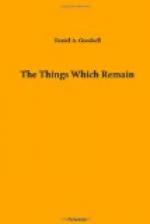[Sidenote: The English Disciples of the German School.]
[Sidenote: Love of Novelty.]
This also is largely true of the English critics. Many of them are well furnished for Greek criticism. The number of Greek Englishmen is still very large. But these seem also to fortify, at least, their own conclusions by the opinions of the original German investigators. It is hard to believe that, in the contests for German professorial position, as well as in the justification of the incumbent when the position is gained, the desire to attract attention by some critical novelty of method or result has not been in some cases, at least, as influential as a simple love of truth.
[Sidenote: Some Questions as to Style.]
There is always the question also, which I profess seems to be one not easy of answer, whether the literary judgments as to style when men are dealing with another language than their own, and especially with Greek and Hebrew, can be as worthy of acceptance as their authors and many others hold them to be; whether, in short, their opinions may not, like those of experts in handwriting, come to be so colored by their personality, or their interests, as to be of little evidential value. On this point it seems to me that not enough allowance has been made by these critics for the difference in style when men write familiarly or didactically, or when they are engaged in narration or exhortation.
[Sidenote: Foundation of Belief Unsettled.]
Whatever may be the truth as to these matters, the present state of faith is due to the unsettlement of the foundation of belief by scientific and critical scholarship.
[Sidenote: A New Foundation to Emerge.]
This unsettlement, admitted on every hand with difference of opinion as to extent, is either to increase until faith in Christianity, except as an ethical and humanitarian system, is dead, or abide until faith revives by a perception that the Church has maintained an erroneous basis for faith and that a new and stronger one is emerging from the sea of discussion. This last I believe to be the truth in the matter. I hold, therefore, that faith is not dying, but suffering in some minds from a kind of lunar eclipse, where a shadow diminishes, temporarily, the radiance, but does not extinguish the planet itself.
[Sidenote: The Authority of the Scriptures Weakened.]
When we ask what foundation is weakened, the answer is: The authority of the Scriptures as the sole rule of faith and practice. Some claim that only a few of the books are genuine and almost none authentic. If this is to be the final judgment of the learned and the sincere, it is plain that we must seek another foundation for faith than the word of Scripture. It is no more a “Thus saith the Lord” for us.
[Sidenote: Critics not yet Agreed.]
[Sidenote: Archaeology and the Bible.]
[Sidenote: Personal Standpoints.]




